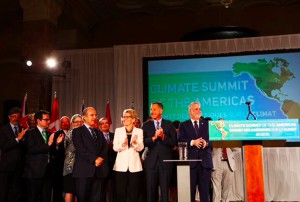NEEDED: POLITICAL WILL IN PARIS .
Three years ago, the nations of the world met at Rio to address the challenge of climate change, and they failed to come to an agreement. At that time we wrote “The events surrounding Rio+20 last month, the huge meeting of governments that was called together by the United Nations, can be seen as a window into history as it is occurring. The nation-states are failing and new institutional frameworks are growing up to take their place.”
Once again, at the end of this year, the nations of the world will meet to address the same problem, this time in Paris. And this time there will be even more pressure on them from other institutional frameworks.
This month 60 mayors from the world’s largest cities, many of them from ICLEI, the global organization of mayors for sustainability, met with the Pope. They demanded “a bold climate agreement that confines global warming to a limit safe for humanity.”
Earlier in the month, 22 representatives from states and regions in North and South America (with the notable absence of national government representatives) met in Canada and signed an agreement to: support carbon pricing; ensure public reporting, take action in key sectors and meet existing greenhouse gas reduction agreements. One commentator called it “a new sense of empowerment & collaboration from sub-nationals across the continent.”
In May, the mayor of Paris, Anne Hidalgo invited 18 mayors from Africa as part of an approach to gather as many stakeholders as possible together to reach consensus before the U.N. summit. With Ignazio Marino, the mayor of Rome, Italy, she also invited mayors of the “capitals and big towns” of the 28 member states of the European Union to a gathering in March. The mayors, representing some 60 million inhabitants, stressed that the “fight against climate change is a priority for our towns and the well-being of our citizens.”
Hidalgo’s office is now working on a project to have 1,000 mayors from around the world present at COP 21, a spokesperson told IPS. The stakes are high because the French government wants the summit to be a success, with a new global agreement on combating climate change.
In May, voters in the oil-rich province of Alberta, Canada overturned the incumbent party in an election marked by opposition to the government’s support of oil companies and their destruction of the environment. The challengers won with a promise to establish tougher policies against climate change.
In April, climate justice advocates, community peoples and mass movements’ representatives met in Maputo, Mozambique to consider the roots, manifestations and impacts of climate change on Africa and to consider needed responses to the crises. They issued a radical declaration that concluded “Conference participants resolved to work with other movements in Africa and globally for the overturning of the capitalist patriarchal system promoted and protected by the global financial institutions, corporations and the global elite to secure the survival of humans and the rights of Mother Earth to maintain her natural cycles.”
It has become increasingly clear that a solution to the problem of global warming is not a technical problem, but rather a political problem. The means are available. It is only the political will that is lacking.
In May, MITEI, the authoritative Energy Initiative of Massachusetts Institute of Technology issued a report stating that solar energy can meet humanity’s future long-term energy needs while cutting greenhouse gas emissions – but to realize this potential will require increased emphasis on developing lower-cost technologies and more effective deployment policy.
At the same time, the Earth Policy Institute published “Seven Surprising Realities Behind The Great Transition to Renewable Energy” showing that the global transition to clean, renewable energy and away from nuclear and fossils is well under way. Their “seven surprising realities:”
1. Solar is now so cheap that global adoption appears unstoppable.
2. Wind power adoption is rapidly altering energy portfolios around the world.
3. National and subnational energy policies are promoting renewables, and many geographies are considering a price on carbon.
4. The financial sector is embracing renewables – and starting to turn against fossils and nuclear.
5. Coal use is in decline in the United States and will likely fall at the global level far sooner than once thought possible.
6. Transportation will move away from oil as electric vehicle fleets expand rapidly and bike- and car-sharing spreads.
7. Nuclear is on the rocks thanks to rising costs and widespread safety concerns.
It is only the political will that is lacking. Will it be there in Paris?







